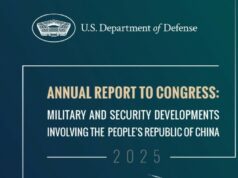Chief of Defence Staff (CDS) General Anil Chauhan confirmed on Saturday that India suffered aircraft losses on day one of the conflict with Pak earlier this month.
On the sidelines of the Shangri-La Dialogue in Singapore, General Chauhan spoke to Bloomberg TV in an interview, where he mentioned losses of fighter jets; however, he did not specify the number.
Refuting Pakistani Claims
“What is important is that, not the jet being down, but why they were being down,” Chauhan said. Earlier this month, Pakistani PM Shehbaz Sharif said Pak shot down six fighter aircraft in India, however, the CDS shot down such claims.
“The good part is that we were able to understand our tactical mistake, remedy it, rectify it, and then implement it again after two days and fly all our jets again, targeting at long range. So then went back on the 7th, 8th and 10th in large numbers to hit air bases deep inside Pakistan, penetrated all their air defences with impunity, carried out precision strikes,” he added.
Gen Chauhan confirmed that the Indian air force “flew all types of aircraft with all types of ordinances on the 10th”.
India’s director general of air operations, Air Marshal A.K. Bharti, had told a press conference earlier in the month that “losses are a part of combat” and that India had downed some Pakistani jets.
Ceasefire Amid Nuclear Concerns?
This clash between India and Pakistan was the worst between the nuclear-armed neighbours in half a century. It began after a gruesome attack was conducted by terrorists in Kashmir’s Pahalgam region on April 22. Armed terrorists killed 26 civilians based on their religion. India launched an Operation Sindoor in retaliation, where it hit several terror bases in Pakistan and PoJK, which was followed by Pakistani retaliation, leading to conflict.
In a question regarding the involvement of US President Donald Trump’s claims of helping the two countries avert a nuclear war, Gen Chauhan said, “I think there’s a lot of space before that nuclear threshold is crossed, a lot of signalling before that, I think nothing like that happened.” He added, “There’s a lot of space for conventional operations which has been created, and this will be the new norm.
Chauhan, and Pakistan’s chairman of the joint chiefs of staff, Gen. Sahir Shamshad Mirza, have both said there was no danger at any time during the conflict that nuclear weapons were considered.
“It’s my personal view that the most rational people are people in uniform when conflict takes place,” he added. During this operation, I observed both sides exhibiting considerable rationality in their thoughts and actions. So why should we assume that in the nuclear domain there will be irrationality on someone else’s part?”
China’s Involvement
Chauhan also said that although Pakistan is closely allied with China, which borders India in the north and east, there was no sign of any actual help from Beijing during the conflict.
“While this was unfolding from April 22nd onwards, we didn’t find any unusual activity in the operational or tactical depth of our northern borders, and things were generally all right.”
Asked whether China may have provided any satellite imagery or other real-time intelligence to Pakistan during the conflict, Chauhan said such imagery was commercially available and could have been procured from China as well as other sources.
He added that while hostilities had ceased, the Indian government had made it clear it would “respond precisely and decisively should there be any further terror attacks emanating from Pakistan.”
“So that has its own dynamics as far as the armed forces are concerned. It will require us to be prepared 24/7.”
(with inputs from Reuters)





